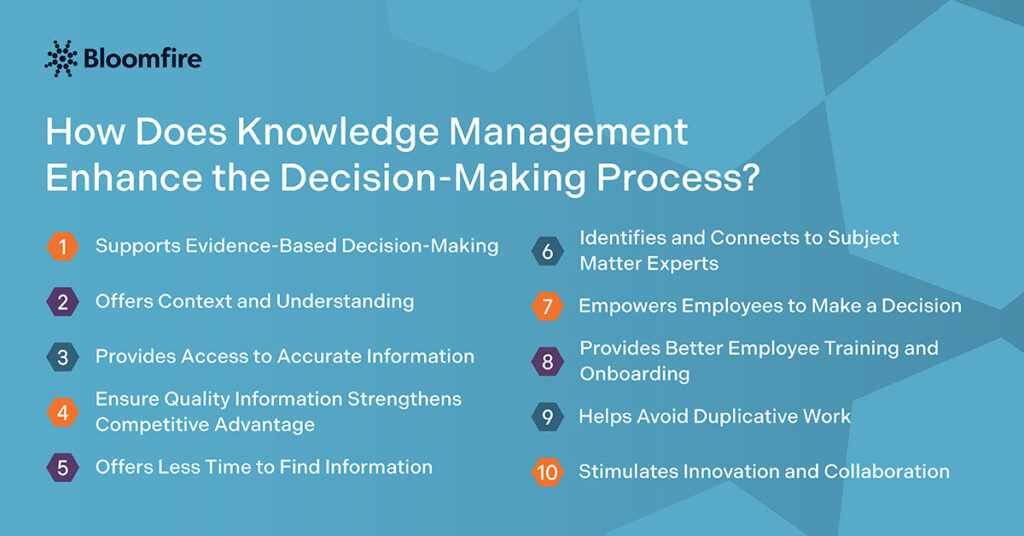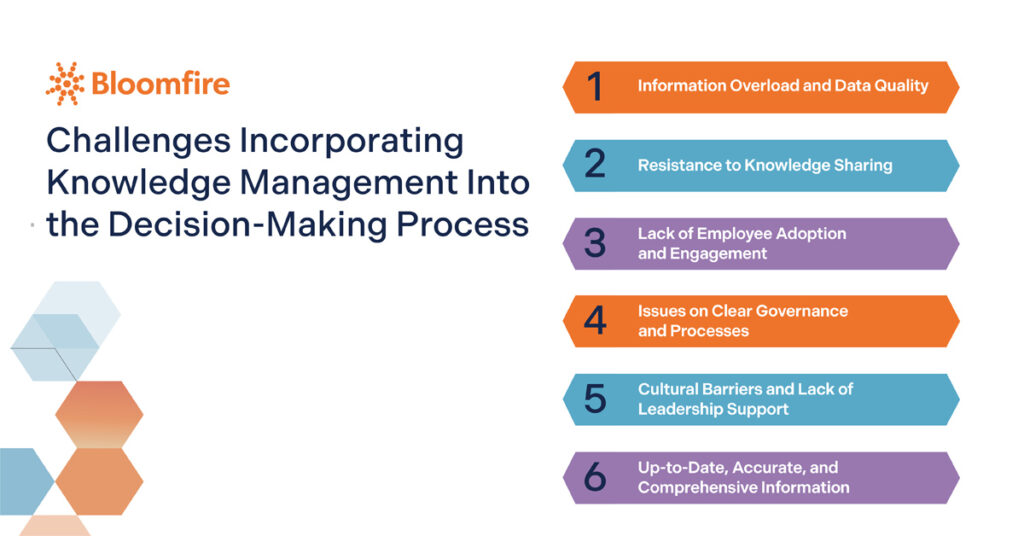Knowledge Management: Why It’s Important to the Decision-Making Process

Are your company and product/service decisions optimized to their fullest potential? Are your decisions informed and backed by crucial information? They should be!
Smart business growth, ROI, and efficiency hinge on sound decisions. Avoiding costly errors means backing choices with data, not guesswork. Understanding how knowledge management enhances the decision-making process is equally important.
KM gives your team a crucial advantage: straightforward access to the vital information needed to make optimal decisions across all business functions, minimizing risks and maximizing positive outcomes. Below, we discuss the impact of knowledge management on decision-making, providing context on its value to company operations.
How Does Knowledge Management Enhance the Decision-Making Process?
Research by Oracle and Seth Stephens-Davidowitz found that 85% of business leaders experience decision stress, and 75% report a tenfold increase in their daily decision volume over the past three years. This highlights a pressing need for improved tools, data integration, and support systems to help leaders navigate the increasing complexity of decisions.
At the forefront of this demand, knowledge management enhances data-driven decision-making by providing access to reliable data, increasing efficiency, streamlining the decision-making process, and reducing the duplication of effort. By implementing a knowledge management system (KMS) into your decision-making process, you can improve the quality and accuracy of decision-making across your organization. Here are the specific improvements in knowledge management for decision-making.

1. Supports Evidence-Based Decision-Making
Effective KM practices ensure that decision-makers have access to pathways that enable them to locate relevant facts and reliable intelligence pertinent to their choices. A readily available pool of verified information helps ground decisions in objective reality, moving choices away from speculation or purely intuition-driven judgments.
Mechanisms such as lessons-learned repositories and communities of practice preserve organizational memory, providing historical evidence about the outcomes of previous actions. Access to this collective intelligence enables leaders to grasp the nuances and implications behind the data, allowing them to make informed judgments that reflect a comprehensive understanding built on shared experience and validated knowledge.
19%
The rate at which knowledge-sharing impacts decision accuracy in product development.
18%
The rate at which knowledge-sharing boosts decision speed in product development.
30%
The rate at which knowledge-sharing improves collaboration in product development.
High impact from decision accuracy (19%) and speed (18%), as well as collaboration (30%), indicates that shared knowledge, enabling data-driven choices, significantly boosts product development efficiency. Source: Bloomfire, 2025 Value of Enterprise Intelligence Report
2. Offers Context and Understanding
The impact of knowledge management on decision-making extends to the intent behind the information. Knowledge management facilitates the synthesis and contextual understanding necessary for informed decisions, especially with big data that may appear as hieroglyphics to untrained eyes. It fosters environments where individuals can share insights, discuss findings, and collaboratively interpret information, adding depth to raw data.
Isolated data points or documents possess limited utility without the surrounding circumstances that give them meaning. Systematic approaches to organizing information assets involve structuring content, interconnecting related materials, and enriching items with crucial metadata (e.g., author, date, and intended purpose).
This careful curation allows individuals navigating these resources to discern connections and grasp the broader context associated with specific pieces of information. Additionally, it captures the rationale behind past decisions and the circumstances that influenced particular outcomes.
3. Provides Access to Accurate Information
The importance of knowledge in decision-making can be better perceived in the accuracy of the data you can utilize. Without a centralized internal knowledge base for company information, employees may dig through various content repositories, search their email inbox, or ask a coworker for the information they need. And there’s no guarantee that what they find will be accurate or up to date.
A knowledge management system enables you to maintain consistent and current information across your organization, ensuring that employees can be confident in the accuracy of the answers they find. The impact resonates throughout the organization. Reduced search times enhance productivity, allowing staff to focus on core tasks instead of hunting for information. Access to verified, up-to-date knowledge supports quicker, more confident decision-making at all levels.
Did You Know? According to our Value of Enterprise Management Report, users prioritize tools providing contextual relevance and visual clarity, commonly utilizing search filters (23%), article/document titles (22%), and search term highlights (21%) when looking for information.
4. Ensure Quality Information Strengthens Competitive Advantage
The information in your knowledge management system is a unique collection of your organization’s collective intelligence, representing your company’s talent, knowledge, skills, and insights. It’s high-quality information your competition can’t access online, meaning the competitive advantage is yours and yours alone.
Leveraging this exclusive knowledge base through effective knowledge management directly enhances strategic decision-making. Teams can draw upon validated internal experiences and unique company insights, enabling faster, more accurate, and context-rich choices than competitors reliant on public data alone.
5. Ensures Faster Information Retrieval
Compared to the mean 8.5 hours employees spend searching weekly without robust KM, those with such programs average only 4.6 hours, saving 3.9 hours per employee weekly. By streamlining the process of finding information, a searchable knowledge management (KM) system enables employees to work more efficiently, allowing them more time for critical thinking in decision-making, such as analysis and evaluation, which enhances the quality and strategic value of their choices.
When critical data and insights are readily accessible, leaders can respond promptly to emerging opportunities or challenges, mitigating risks. Faster access fosters efficiency and greater confidence and rigor in arriving at well-supported conclusions, making the organization more agile and responsive.
6. Identifies and Connects to Subject Matter Experts
Finding subject matter experts inside an organization can often feel like searching for a needle in a haystack if you can’t qualify the types of knowledge they have. However, implementing a knowledge management system directly addresses this by highlighting experts through detailed profiles, emphasizing their skills, experience, and documented contributions.
This organized discovery makes specialized talent readily discoverable throughout the enterprise, irrespective of formal team structures or location. As a result, individuals facing tough decisions gain the crucial ability to pinpoint internal authorities who possess a deep understanding of the situation.
Interaction with subject matter specialists gives decision-makers access to critical, tacit insights, historical context, and seasoned judgment that complements explicit data. Choices informed through this facilitated expert consultation are more sound and strategically aligned, enhancing organizational outcomes.
7. Empowers Employees to Make Accurate Decisions
When staff members can look up information in any type of KM system, they are less reliant on asking their peers or managers for help. This gives them a greater sense of autonomy and increases job satisfaction because they’re more empowered to make decisions that are appropriate to their roles and responsibilities.
Confidence can make or break decisions because those who make decisions without it tend to overthink their choices. In contrast, those with more confidence, particularly those with all the necessary information, increase the chances of making the right decision. Studies also suggest that the speed at which you decide relates to how sure you feel, as your brain processes information, and the speed itself affects your sense of confidence.
8. Provides Better Employee Training and Onboarding
Knowledge management affects all business areas, including employees’ onboarding and training processes. When your newest employees have access to your highest-skilled employees’ expert insights, information, and guidance, they can get up to speed more quickly and start making informed decisions in their roles.
Furthermore, this structured access to core knowledge results in more reliable decision-making. New employees using the KM system learn procedures and rationale grounded in collective organizational experience rather than potentially incomplete peer-to-peer instruction. This standardized foundation reduces initial errors and ensures their judgments adhere to proven methods. As a result, the organization cultivates competent decision-makers faster, equipped with the context and information needed for effective performance in their roles.
9. Helps Avoid Duplicative Work
Without a centralized knowledge management system, employees often lack awareness of the information available across the organization, and they may inadvertently duplicate existing work as part of their decision-making process. A KM system allows them to search everything documented across the organization, so they don’t have to start at square one with every decision.
This ability to leverage prior work directly enhances the quality and speed of decision-making processes. Valuable time and intellectual energy, otherwise consumed in redundant activities, get redirected toward deeper analysis or exploring novel aspects of the current challenge. Decisions can build upon established findings and completed analyses, leading to richer, more informed outcomes.
10. Stimulates Innovation and Collaboration
Creating channels for open interaction and shared understanding across an enterprise aids organizational progress. Purposeful approaches to harnessing internal knowledge achieve this through shared platforms and readily available information pools.
These tools encourage interaction among individuals who might not otherwise connect, dismantling functional and information silos. Consequently, employees enjoy the free exchange and cross-pollination of ideas, fostering collective problem-solving and laying the groundwork for innovative thinking vital to strong decision-making processes.
Building on enhanced collaboration, readily available diverse information and experiences fuel innovative thought processes. When individuals can easily explore ideas, data, and lessons learned from across the organization, they are better equipped to synthesize information in new ways or identify unmet needs.
Challenges Incorporating Knowledge Management Into the Decision-Making Process
Businesses face several challenges when incorporating knowledge management into their decision-making processes. For instance, there is an inherent difficulty in capturing and codifying tacit knowledge held by individuals, coupled with employee resistance to sharing their expertise or a lack of perceived value in doing so.
Acknowledging the hurdles in integrating knowledge management into decision-making allows organizations to proactively address potential pitfalls that could undermine the effectiveness of their KM initiatives. To do this, check out some common challenges to look out for and how to remedy them.

1. Information Overload and Data Quality
As organizations accumulate vast amounts of data or information from various sources, KMS can become repositories of valuable insights and irrelevant, outdated, or poorly organized content. When decision-makers face an overwhelming volume of information, it becomes increasingly difficult and time-consuming to sift through the noise. This hurdle makes identifying the specific, high-quality knowledge needed for informed choices difficult.
Information overload can lead to analysis paralysis, delayed decision-making, or reliance on incomplete or easily accessible but less relevant information. Ultimately, it undermines the potential benefits of a KM system.
Compounding the problem of information overload is the persistent challenge of data quality, especially for artificial intelligence (AI) use. If the information stored in the knowledge management system is inaccurate, inconsistent, or incomplete, it erodes trust and renders it unreliable for decision-making. Decision-makers encountering flawed data will likely disregard the KM system and revert to familiar, yet potentially less informed, methods.
To deal with these quality challenges, cleansing and governance processes are needed. This is where the self-healing principle of Enterprise Intelligence becomes handy. With self-healing data readiness, you address existing data quality issues and continuously monitor and automatically rectify data drift and the accumulation of ROT (Redundant, Outdated, Trivial) data in real-time. Investing in intelligent data pipelines will ensure that data remains consistently relevant and accurate, minimizing the need for manual intervention.
2. Resistance to Knowledge Sharing
When employees become unwilling to contribute their expertise, insights, and best practices to a central knowledge repository, the foundation of the KM system is weakened. This reluctance can stem from various factors, including a “not invented here” syndrome where individuals undervalue knowledge from external or internal sources outside their immediate team. It can also come from the fear of losing job security by making their expertise readily available, or simply a lack of time and perceived incentive to document and share their knowledge.
Addressing resistance to knowledge sharing requires organizations to cultivate a culture that explicitly values and rewards knowledge sharing. Start by implementing recognition programs for active contributors, demonstrating leadership’s commitment to KM, and communicating the benefits of knowledge sharing for individual and organizational success. Make the knowledge-sharing process as seamless and integrated as possible into daily workflows. And provide user-friendly tools and platforms, offering dedicated time for knowledge documentation.
3. Lack of Employee Adoption and Engagement
Without active participation in capturing employee expertise, sharing insights, and updating information, the knowledge base remains incomplete and potentially outdated. As a result, decision-makers lack access to the full spectrum of organizational knowledge. This leads them to rely on incomplete data, personal biases, or outdated information, undermining the purpose of implementing a KM system for improved decision-making.
In contrast, demonstrating tangible value and fostering a culture of collaboration allows the company to encourage greater employee adoption and engagement. Prioritizing these initiatives enriches the knowledge base and enhances the quality of sales strategy decisions.
To do this, implement a strategy that clearly articulates the benefits for the departments (e.g., faster access to winning proposals, reduced time spent creating new materials). You can also provide user-friendly training and ongoing support, integrate knowledge sharing into regular team meetings, and recognize contributions to the KM system.
4. Issues on Clear Governance and Processes
The lack of standardized processes for accessing and utilizing knowledge within the decision-making workflow creates inconsistencies and inefficiencies. Without clear protocols for when and how to consult the KM system or incorporate its insights into the decision-making framework, its impact will be limited and sporadic.
Different individuals or teams may have varying approaches to leveraging the available knowledge, leading to a lack of uniformity and potentially suboptimal outcomes. The absence of a structured approach also makes it challenging to track the impact of KM on decision-making outcomes and to identify areas for improvement in the system and its integration.
There’s no doubt that you must establish a robust governance framework and implement clear processes for your KM initiatives. In doing so, consider the following steps:
- Assign ownership for different knowledge domains
- Develop clear workflows for knowledge capture, validation, storage, and retrieval
- Create policies outlining how the KM system will be managed
- Educate employees on the governance KM framework and processes
- Conduct periodic audits of the KM system
In taking these steps, organizations can transform their KM system from a chaotic data collection into a valuable and reliable resource. Therefore, they can effectively support and enhance decision-making, eliminating confusion and ambiguity. This benefit extends to change management, as the governance framework becomes institutionalized.
5. Lack of Leadership Support
When leaders fail to champion KM initiatives, it sends a clear message throughout the organization that knowledge sharing and utilization are not priorities. The lack of endorsement can be perceived in various ways. For example, this can manifest as insufficient resource allocation for KM tools and personnel, a failure to participate in knowledge-sharing activities actively, and a lack of accountability for leveraging organizational knowledge in strategic decision-making.
The complete absence or lackluster leadership support can lead to knowledge management failures. Executives and managers should be actively involved in KM initiatives and clarify that utilizing the KM system is an expectation for informed decision-making. Keep in mind that employees quickly perceive if KM is not a priority, leading to minimal participation and the platform becoming an underutilized digital shelf.
6. Up-to-Date, Accurate, and Comprehensive Information
Another key challenge is ensuring that the data and information available to team members is up-to-date, accurate, and comprehensive. Poor data quality significantly erodes data trust, as 67% of organizations report a lack of complete confidence in the data they use for decision-making.
And since your team members base decisions on the information provided in the KM platform, you must ensure it is as up-to-date and reliable as possible. Under normal circumstances, this could be time-consuming and tedious. However, you can overcome this challenge by having a system to update and regularly verify the accuracy of your knowledge.
Ideally, your knowledge management platform should allow you to automate the repetitive parts of this process (e.g., scheduling content to be reviewed or unpublished once it goes out of date). Choose the right KM system that corresponds to your need to eliminate redundant, obsolete, and trivial (ROT) information. Key features to look for include search capabilities, AI and collaboration tools, customization options, etc.
Frequently Asked Questions
How does access to more knowledge impact the confidence of a decision-maker?
Access to a broader range of relevant information empowers decision-makers with a more comprehensive understanding of the situation. It reduces uncertainty and allows for a more thorough evaluation of options and potential outcomes. As a result, individuals feel more secure in their choices, leading to increased confidence in their decisions.
What is decision-making architecture in knowledge management?
Decision-making architecture in knowledge management refers to the framework and systems designed to integrate organizational knowledge into the decision-making processes. It encompasses the structures, technologies, and processes that facilitate the flow of relevant knowledge to the right people at the right time for informed choices. This architecture ensures decision-makers can access, understand, and apply available knowledge effectively, leading to more consistent and higher-quality outcomes.
How does knowledge management improve organizational performance?
Knowledge Management enhances organizational performance by facilitating better and faster decision-making through readily available, accurate information. It fosters innovation and problem-solving by connecting employees with relevant expertise and past experiences. Furthermore, KM promotes continuous learning and the codification of best practices, leading to increased efficiency and a stronger competitive advantage.
Impact of Knowledge Management on Decision Making
Despite the potential challenges of integrating knowledge management in your organization’s decision-making process, the benefits outweigh these barriers. Employees can quickly become comfortable with this system with the right tools and training. And when employees regularly tap into the information that exists across the organization, your company’s knowledge becomes a true source of competitive advantage.
Supercharge Your Decision-Making Process
Use Bloomfire’s trusted tools for accurate information and make them accessible for better decision-making.
Explore Bloomfire


How to Organize a Knowledge Base: A Step-by-Step Guide

11 Benefits of Knowledge Management (+ KMS Advantages You Shouldn’t Miss)

Start working smarter with Bloomfire
See how Bloomfire helps companies find information, create insights, and maximize value of their most important knowledge.

Take a self guided Tour
See Bloomfire in action across several potential configurations. Imagine the potential of your team when they stop searching and start finding critical knowledge.